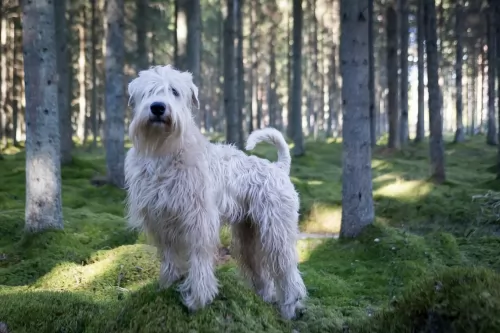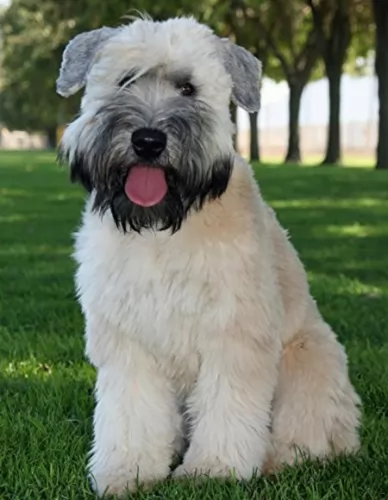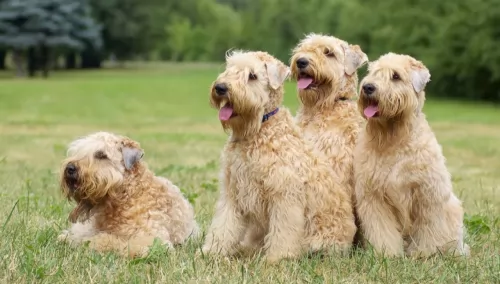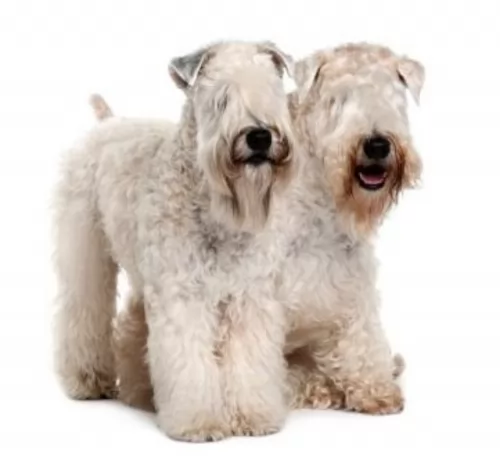 Petzlover
Petzlover Bouvier des Flandres is originated from Belgium but Soft-Coated Wheaten Terrier is originated from United Kingdom. Bouvier des Flandres may grow 20 cm / 8 inches higher than Soft-Coated Wheaten Terrier. Bouvier des Flandres may weigh 32 kg / 71 pounds more than Soft-Coated Wheaten Terrier. Bouvier des Flandres may live 3 years less than Soft-Coated Wheaten Terrier. Both Bouvier des Flandres and Soft-Coated Wheaten Terrier has almost same litter size. Both Bouvier des Flandres and Soft-Coated Wheaten Terrier requires Moderate Maintenance.
Bouvier des Flandres is originated from Belgium but Soft-Coated Wheaten Terrier is originated from United Kingdom. Bouvier des Flandres may grow 20 cm / 8 inches higher than Soft-Coated Wheaten Terrier. Bouvier des Flandres may weigh 32 kg / 71 pounds more than Soft-Coated Wheaten Terrier. Bouvier des Flandres may live 3 years less than Soft-Coated Wheaten Terrier. Both Bouvier des Flandres and Soft-Coated Wheaten Terrier has almost same litter size. Both Bouvier des Flandres and Soft-Coated Wheaten Terrier requires Moderate Maintenance.
 These large dogs have descended from Flemish cattle dogs, and in French, the word Bouvier means herdsman or cattle herder. This is because the dog was used for driving cattle. The Bouvier comes from the Flemish region of Belgium where it was bred as a working farm dog. It is believed that the breed may have come from crossing local farm dogs with imported Irish Wolfhounds, Schnauzers, Tibetan Mastiffs, Brabanters, Griffons and Beaucerons.
These large dogs have descended from Flemish cattle dogs, and in French, the word Bouvier means herdsman or cattle herder. This is because the dog was used for driving cattle. The Bouvier comes from the Flemish region of Belgium where it was bred as a working farm dog. It is believed that the breed may have come from crossing local farm dogs with imported Irish Wolfhounds, Schnauzers, Tibetan Mastiffs, Brabanters, Griffons and Beaucerons.
It was in 1910 that the first Bouviers appeared at the international dog show in Brussels, with a standard for the breed being adopted in 1912.The American Kennel Club recognized the dog in 1929. It was after World War 11 that Bouviers were brought to America and the American Bouvier des Flandres Club was founded in 1963.
 This wheaten colored terrier hails from Ireland. Although the Wheaten has been around for a long time, it was in 1937 that he was recognized as a breed in Ireland.
This wheaten colored terrier hails from Ireland. Although the Wheaten has been around for a long time, it was in 1937 that he was recognized as a breed in Ireland.
The British Kennel Club also recognized the Wheaten and the dog was also exported to the United States. Serious interest started being shown for the Terrier in the 1970s. It was in 1973 that they were recognised by the American Kennel Club.
 The Bouvier is a large compact, well built dog with strong muscled limbs. He stands at roughly 59 to 70 cm high at the withers, weighing between 27 and 52 kg. He has a large head with a thick and abundant coat which is of rough appearance. The coat is mostly black, but you’ll also find a range of other shades such as brindle, grey and fawn.
The Bouvier is a large compact, well built dog with strong muscled limbs. He stands at roughly 59 to 70 cm high at the withers, weighing between 27 and 52 kg. He has a large head with a thick and abundant coat which is of rough appearance. The coat is mostly black, but you’ll also find a range of other shades such as brindle, grey and fawn.
The back of the dog is level and broad, and is typically wider in female dogs. The back legs are strong and muscular. Some Bouvier des Flandres are born tail-less and this is most attractive. Most Bouvier dog owners used to have the tails docked because of the excellent appearance, but with docking now being banned, the tail is kept long. The muzzle is wide, the nose large, the eyes dark brown and the ears high set and floppy.
The Bouvier is intelligent, energetic and full of confidence while being calm and balanced in temperament. The puppies are vocal and full of antics, but as the Bouvier grows into adulthood, he mellows and becomes a steady family friend who gets on well with each human family member. He loves spending time with his family and becomes both friend and guardian, making a good watchdog too.
 The Wheaten is a medium sized dog standing at between 43 and 50cm and weighing between 13 and 20kg both male and female. The coat of the dog is soft, silky and wavy to even curly and is a wheaten to ginger color.
The Wheaten is a medium sized dog standing at between 43 and 50cm and weighing between 13 and 20kg both male and female. The coat of the dog is soft, silky and wavy to even curly and is a wheaten to ginger color.
The coat of the puppy is dark but as he grows up it changes into the wheaten color although the ears may be a dark brown color. Pet owners like that the Wheaten is a very low shedding dog.
Playful, social and friendly, the Wheaten has always been put to good use on the farm. These days he is pet and companion. He is energetic and playful so children love having him around.
He is slightly more hyper and energetic than other Terrier breeds so will require a good dose of exercise.
He is smart and strong willed, and training and socialization turns him into an amicable pet to have around, so much so that he is sought after as a therapy-dog.
They’re easy-going dogs with no aggression issues but they still make great watch dogs and want to do whatever it takes to look after- and protect their human family.
 The Bouvier is such an amicable dog and strong and energetic too. He makes the most marvellous companion and will happily adapt to life in the city or in the country, although, with his big size, he is better suited to a home where there is enough space to run around in.
The Bouvier is such an amicable dog and strong and energetic too. He makes the most marvellous companion and will happily adapt to life in the city or in the country, although, with his big size, he is better suited to a home where there is enough space to run around in.
He is loyal, loving and protective and when you make sure to make him an active part of your family, you’ll find in him all the characteristics of a true friend.
 The Soft Coated Wheaten Terrier has always made an excellent farm dog, but today he is more suited as pet and companion.
The Soft Coated Wheaten Terrier has always made an excellent farm dog, but today he is more suited as pet and companion.
He adapts easily to life in the city or the countryside. Wherever he is, he will need his exercise. He also longs to be an active part of his human family, and then he’s happy, lively, social and friendly and is a great playmate for children.
 The big teddy-bear of a dog is a healthy breed, but as a large dog, you will need to look out for certain health problems with him.
The big teddy-bear of a dog is a healthy breed, but as a large dog, you will need to look out for certain health problems with him.
Xrays have been done on many Bouvier des Flandres by the Club and by the Orthopedic Foundation of America and it has been found that a significant percentage of Bouviers were dysplastic. Hip dysplasia is a deformity of the hip joint and many large breed dogs battle with this. It can be very sad for dog lovers as they watch their dog battling to get up after lying down and sometimes lameness in the hind legs.
Dental disease is a common problem in many dogs, and the Bouvier isn’t excluded one bit. If you don’t brush your pet’s teeth with special dog toothpaste and toothbrush, there is tartar build-up which can lead to bad breath and gum infection. Dental disease can lead to pain in the teeth and even the loss of teeth. Bad teeth affect the entire body, and the heart, kidneys and joints can all be negatively affected.
The Bouvier is a large dog prone to obesity. This is a serious disease that can lead to all kinds of digestive disorders, back pain as well as heart disease. It can be easy just to give in to your pet’s pleading eyes, but in the long run, excessive weight can spell a host of health problems.
 When you bring a Wheaten Terrier into your home, you’re not likely to have too many vet fees as he tends to be a healthy dog breed, being able to reach 13, 14 or 15 years of age with good care.
When you bring a Wheaten Terrier into your home, you’re not likely to have too many vet fees as he tends to be a healthy dog breed, being able to reach 13, 14 or 15 years of age with good care.
Look out for a dog ailment known as Protein-losing enteropathy (PLE). This is a condition where the dog isn’t able to properly absorb protein in the digestive tract, so that it is passed in their stools.
It can be fatal, but if caught early, some dietary changes can keep it under control.
Also, look out for inflammatory bowel disease. This disease occurs when the stomach of the dog has a large number of inflammatory cells which can change the lining of the digestive tract, preventing the normal absorption of food.
 Your Bouvier is an intelligent, independent dog and you will be doing him a favor by having him socialized and trained. He becomes such a pleasure to have around, being obedient and willing to respond to your commands.
Your Bouvier is an intelligent, independent dog and you will be doing him a favor by having him socialized and trained. He becomes such a pleasure to have around, being obedient and willing to respond to your commands.
Every dog, and particularly large dogs like the Bouvier, should be able to rely on a daily walk, a run in the park or on the farm and have special games from his owner. Not only does participating in activities together build a strong bond between dog and owner, its important to avoid boredom and frustration with your dog. You bought him so you therefore have a responsibility toward him.
Your Bouvier des Flandres has a thick, medium-length coat that gets a shaggy look to it. The breed needs regular brushing every second day or so to get rid of loose hairs and to prevent the hair matting. He will require some professional grooming to look and feel his best. With his thick coat, he is hypoallergenic which can be a relief for allergy sufferers.
The Bouvier has to be on high-quality dog food, whether you give him home-made food or commercially manufactured food. It has to have the right amount of vitamins and minerals. If you’re unsure about feeding a dog, remember that the amount and type of food you give your pet must be appropriate to your dog’s age, size and energy levels.It can also be wise to know which human foods are bad. Speak to your vet about your dog – they are a minefield of useful information about your pet. Fresh, cool water should be be available at all times.
 Brush your pet’s silky coat twice a week. Such a silky coat can get all tangled and matted. If you prefer, many people opt to rather have the Wheaten’s coat professionally clipped as then it is easier to handle. They like to have the hair clipped that hangs over the dog’s eyes.
Brush your pet’s silky coat twice a week. Such a silky coat can get all tangled and matted. If you prefer, many people opt to rather have the Wheaten’s coat professionally clipped as then it is easier to handle. They like to have the hair clipped that hangs over the dog’s eyes.
Other grooming tasks require you to check inside his ears for redness which could indicate an infection. Trim his nails and check him over for ticks and fleas.
Have your Wheatie trained and socialized as he is a stubborn dog breed and you want him to be well mannered and obedient.
Terriers like this are energetic dogs and he is going to need exercise every day. A walk for a dog is always a welcome experience as it gives him the opportunity to sniff around and pick up new smells. Play ball- or frisbee games with him as this can tire him out a bit.
If your dog shows signs of illness, get him to the vet. He is such a feisty dog that it can be unbearable to see him out of sorts.
Terriers are energetic dogs so if you feed your dog one of the commercial dog foods, make sure the label indicates what food it is. This is because the foods are manufactured according to the type of dog it is, its age, size and energy levels.
Always try and go for the high quality foods which don’t have all those unhealthy ingredients in them. Try to include some home-made food – nothing exotic and spicy – just plain, wholesome food that won’t upset his stomach.
Boiled chicken, brown rice or pasta and spinach, sweet potatoes and carrots is super tasty and nutritious. You can chop it up and add it to your pet’s kibble twice a week.
Try and include a little bit of raw meat to his diet occasionally as this can go towards ensuring he doesn’t get skin diseases. Always ensure he has a constant supply of fresh, cool water available.